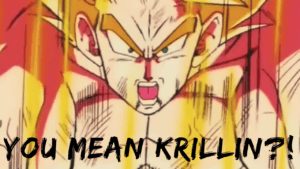Let’s learn Japanese with Goemon’s quote from Lupin the Third (Rupan Sansei).
CONTENTS
Video
Goemon’s Quote
Japanese: またつまらぬ物を斬ってしまった。
Romaji: mata tsumaranu mono o kitte shimatta.
English: Once again I have cut a worthless object.
Analysis
また means “again”.
つまらぬ is an old-fashioned and classical way of saying つまらない meaning “worthless”. Goemon often speaks in this old-fashioned way because he has a samurai spirit.
物 means “a thing” or “an object”.
The particle を is used to indicate what comes before is the direct object of the verb. So in this sentence, つまらぬ物 is the object that is affected by the action of the following verb.
And the verb here is 斬って which is the te-form of the verb 斬る meaning “to cut”. So つまらぬ物を斬る means “to cut a worthless object”. If you learned the kanji for “cutting” you might know this kanji (切る) which is commonly used. For example, リンゴを切る meaning “to cut an apple”. Whereas this kanji (斬る) is used when cutting something or someone by a sword. For example, 刀で人を斬る meaning “to cut a person by a sword”.
しまった is the past tense of しまう and the te-form of the verb followed by しまう means “to do something unintentionally”. It implies cutting a worthless object is not what Goemon wants to do and it is a regrettable thing for him.
Examples
また (again)
じゃ、また来週。
ja, mata raishū.
Well, see you again next week.
明日また来ます。
ashita mata kimasu.
I will come again tomorrow.
また同じ失敗をしてしまった。
mata onaji shippai o shite shimatta.
I made the same mistake again.
斬る vs 切る (“to cut by a sword” vs “to cut”)
腹切りのあと、介錯人が首を斬る。
harakiri no ato, kaishakunin ga kubi o kiru.
After Harakiri, Kaishaku-nin will cut the head.
人斬り侍が髪を切った。
hitokiri-zamurai ga kami o kitta.
Man-slaughter samurai cut his hair.
彼と縁を切ろうとしたら、日本刀で斬られそうになった。
kare to en o kirō to shitara, nihontō de kiraresō ni natta.
When I tried to cut off a relationship with him, I was almost cut by a Japanese sword.
Verb Te-Form + しまう (to do something unintentionally)
見るなと言われると、逆に見たくなってしまう。
miruna to iwareru to, gyaku ni mitaku natte shimau.
If I was told not to look, I want to look even more.
寝坊して、電車に乗り遅れてしまった。
nebō shite, densha ni noriokurete shimatta.
I slept in and I missed the train.
大切な皿を割ってしまった。
taisetsu na sara o watte shimatta.
I broke an important plate.
It also means “to finish something” depending on the context.
箱の中のクッキーは全部食べてしまっていいですよ。
hako no naka no kukkī wa zenbu tabete shimatte ii desu yo.
You can finish all of the cookies in the box.
In casual speech, ~てしまう/でしまう can be substituted by 〜ちゃう/じゃう respectively.
- 食べてしまう → 食べちゃう
- 飲んでしまう → 飲んじゃう
Support Easy Peasy Japanesey
If you enjoy our content, please consider supporting Easy Peasy Japanesey. Your support will help keep us going. Thanks for all your support!


